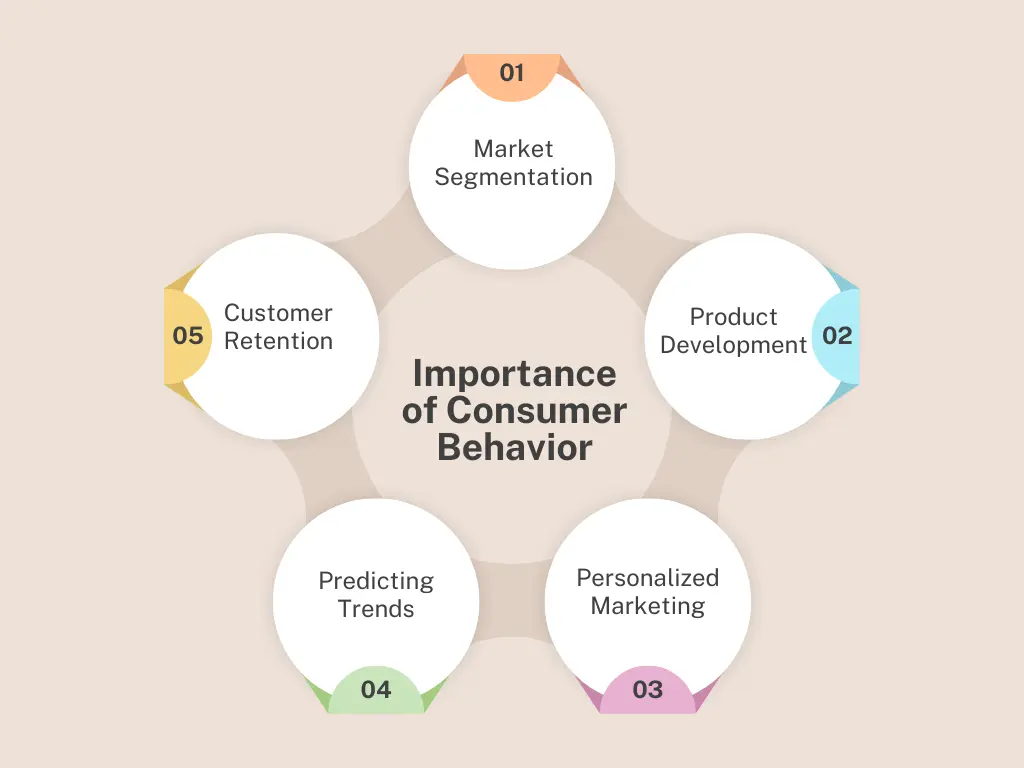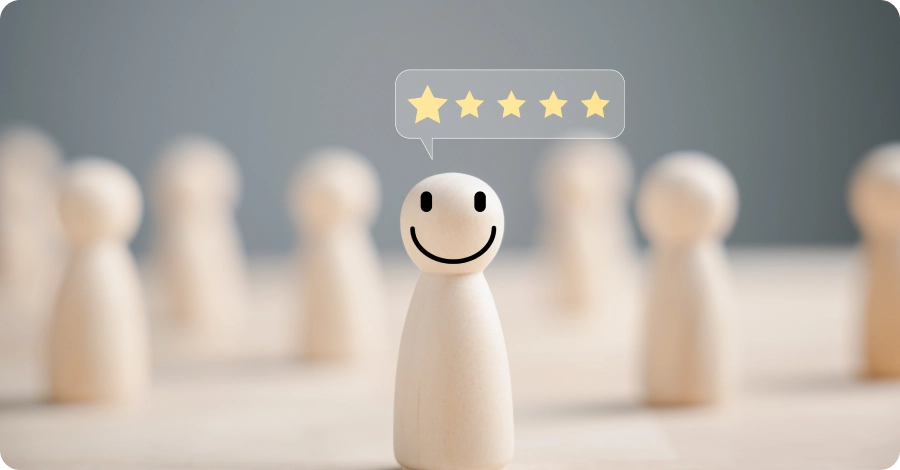Consumer Behavior: Types, Scopes, Models, & Tools
- September 21, 2023
- 14 mins read
- Listen

Why do consumers choose one product over another? What influences their buying habits, preferences, and brand loyalty? These questions lie at the core of consumer behavior—a field that reveals the psychology behind shopping patterns and decision-making.
Businesses that truly understand consumer behavior can create personalized marketing strategies, predict trends, and build stronger relationships with their audience. From uncovering what motivates buyers to analyze post-purchase satisfaction, consumer behavior offers invaluable insights to help businesses stay ahead.
This blog dives deep into the concept of consumer behavior, its role in marketing, and practical strategies to leverage these insights.
What is Consumer Behavior?
Consumer behavior studies how people, groups, and organizations select, buy, use, and discard products, services, or ideas. It considers psychological, social, cultural, and economic factors in their buying behavior.
By analyzing consumer behavior, businesses can gain a better understanding of the needs and preferences of their customers, thus helping them devise more effective marketing strategies and offer improved customer experiences.
Key aspects of consumer behavior include:
- Decision-making Process: How far and on what basis do consumers recognize their needs, search for data, evaluate, make a purchase, and review their choices?
- Motivations and Influences: Psychological drivers such as emotions, perceptions, and attitudes of the people, along with social trends, culture, and peer influence.
- Behavioral Patterns: Analyzing purchase frequency, brand loyalty, and online vs. offline buying habits to predict trends.
Types of Consumer Behavior
For a business, it’s very important to study different consumer behavior types and tailor their marketing strategies accordingly. This is the best way to meet consumer needs effectively and boost a certain degree of loyalty. However, consumers may exhibit different behaviors depending on the specific circumstances of each buying decision.
Here are the most common types of consumer behavior –
1. Habitual
When customers exhibit habitual buying, they make quick decisions, choose a brand over another without much thought, and hardly care about research. Such buyers either buy based on familiarity with a brand or are influenced by a lower price tag.
2. Complex
This kind of behavior is generally seen in the purchase of an expensive product or service. Since the cost is high, consumers may research, read reviews, analyze features, consult friends or family, and compare with other options before making a buying decision.
3. Dissonance Reducing
This type of behavior is visible when buying expensive items or making risky purchase decisions. Because the cost is high, consumers tend to feel confused about their decision, so they may seek some kind of reassurance and feedback from others to reduce confusion.
4. Variety Seeking
This type of behavior is visible in those customers who are variety seekers and like to switch between brands and products within a category. Since they are brand hoppers, they lack strong brand loyalty and rather prefer new experiences.
5. Impulsive Buying
This type of behavior is seen in cases where buyers make spontaneous and unplanned purchases. Emotions are the driving force in such behavior types where consumers may not seek much information or analysis.
6. Brand Loyalty
Some consumers show strong brand loyalty, consistently choosing a specific product or brand over others. This behavior is driven by a deep emotional connection to a brand.
7. Analytical
These types of buyers are quite methodical with their purchase decisions. They use data, facts, information, and logic to buy a product. They do deep research and analyze the pros and cons of their decisions before making a purchase.
Scope of Consumer Behavior
Consumer behavior is a dynamic and expansive field that explores how people make purchasing decisions and what drives them to make those choices. It provides valuable insights into consumer preferences, motivations, and decision-making processes, which enable businesses to craft strategies that ensure maximum impact.
The scope of consumer behavior finds applications across industries and, therefore, plays a critical role in shaping modern marketing practices.
Key areas within the Scope of Consumer Behavior
1. Analysis of Purchase Decision
The prime focus of consumer behavior is to decipher the process of decision-making. It deals with how consumers perceive their needs, evaluate alternatives, and make a purchase. This knowledge allows businesses to design marketing strategies that can appeal to the expectations of consumers.
2. Brand Preference Identification
Knowing for what reasons consumers like one brand more than any other is central to this field. It’s all about analyzing emotional connections, brand loyalty, and perceived value that will help marketers frame compelling brand stories.
3. Analyzing Psychological, Social, and Cultural Forces
Consumer behavior examines the psychological motives, social, and cultural factors that predispose people toward certain buying habits. From peer pressure to personal values, all these aspects make one reach a decision to purchase and thereby provide a platform for effective messaging.
4. Knowing Attitudes and Preferences
Companies study consumer behavior through surveys, experiments, and data analysis to assess the attitudes, opinions, and preferences of consumers. This helps in refining products and marketing campaigns to meet audience expectations.
5. Market Segmentation for Effective Target Marketing
Market segmentation is a straightforward application of consumer behavior insights. It helps a business to carve out audiences into specific groups based on demographics, behaviors, and psychographics to ensure personalized and effective marketing.
6. Measuring Marketing Effectiveness
Consumer insights are necessary to the success of marketing campaigns. Understanding how campaigns resonate with audiences allows businesses to iterate on messaging, branding, and promotional efforts that will drive conversions.
7. Understanding Cultural and Economic Impact
Consumer behavior also considers cultural and economic variations that shape buying patterns in a globalized economy. Companies can then adopt strategies to reach diverse audiences across markets.
8. Technology Adoption Trend Tracking
Modern consumers are quick to adopt innovative technologies. The study of behavioral patterns aids an enterprise in assessing the readiness of the people for any new technology and thus in predicting the adoption trends, which will guide product development and marketing approaches.
Theories of Consumer Behavior
Consumer behavior is a complex field where any study needs to analyze and understand various perspectives. This has led to the development of several theories to tell consumer behavior in specific contexts.
Here are some of the popular theories of consumer behavior –
1. Theory of Planned Behavior (TPB)
The Theory of Planned Behavior is based on the assumption that intention drives consumer behavior. It states that three factors — attitude, subjective norm, and behavioral control— are key aspects behind a decision taken by a consumer.
2. Maslow’s Hierarchy of Needs
Maslow’s Hierarchy of Needs is a popular psychological theory that suggests consumers have different levels of needs and they gradually prioritize and hierarchically meet these needs. They gradually progress up the hierarchy as lower-level needs are met.
3. Cognitive Dissonance Theory
The Cognitive Dissonance Theory suggests that individuals feel dissonance when their attitudes conflict with their actions. In consumer behavior, consumers experience dissonance after a purchase when they question the decision.
4. Social Cognitive Theory (SCT)
The Social Cognitive Theory is based on the idea that people influence one another through persuasion. It suggests our thoughts, feelings, and actions are driven and regulated by various cognitive processes such as attention, memory, knowledge, and perception.
Popular Consumer Behavior Models
Companies often use consumer behavior models to understand how consumers may react in a certain market and how they respond to certain products, pricing, and product features and advertisements. These models are very helpful in making certain marketing or business development decisions.
Here are some of the popular consumer behavior models –
1. Psychological or Learning Model
This model is based on Maslow’s hierarchy of needs which says buyer behavior often corresponds with the desire to feel basic needs and meet emotional requirements. This model suggests that people often address their basic needs first before moving ahead to fulfill their psychological needs.
2. Sociological Model
The model states that a person typically purchases items that align with their values or expectations. It also states that purchasing habits are also influenced by buyers’ social standing. So, a business can benefit from this model by creating experiences based on the class of people who typically buy the products.
3. Psychoanalytical Model
This model states that every buyer possesses conscious and unconscious motives that often drive their purchase decisions. This model is based on a psychological theory developed by Sigmund Freud that is meant to understand human behavior and personality. The main focus of this model is on the unconscious mind and how it affects a buyer’s thoughts, feelings, and behaviors.
4. Economic Model
This model states that consumers will first evaluate the value of a product compared to its price and then buy the most value-driven item available to them. Price, substitution, and income are the three key concepts that drive this model.
5. Engel-Kollat-Blackwell (EKB) Model
The EKB model outlines five stages in the decision-making process of most consumers as these stages are what many follow before buying an item. Awareness, Information Gathering, Evaluation, Decision, and Outcome Analysis are the five stages suggested by this contemporary model.
6. Howard Sheth Model
This model is based on the assumption that the buying decision is driven, and affected, by certain variables. These variables are the reasons why buyers solve their problems and make the relevant buying decision. The four most common variables in this model include inputs, Perceptual Constructs, Outputs, and External Variables.
7. Black Box Model
This model states that most consumers respond to stimuli when making purchases. A buyer internalizes an external stimulus, processes it, and compares it to their interests to make a buying decision. As per this model, most consumers purchase items only after understanding how they can add value to their lifestyle.
Why is Consumer Behavior Important in Marketing?

To effectively meet customer needs, businesses must first understand what influences their decisions. The following points highlight why analyzing consumer behavior is critical for marketing success.
- Market Segmentation: Marketers would segment their audience based on behavior patterns, demographics, and psychographics so that effective marketing campaigns address very specific needs.
- Product Development: Insights into consumer preference will help businesses in building products to meet expectations for better satisfaction and loyalty.
- Personalized Marketing: Understanding the behavior of consumption allows businesses to deliver personalized experiences that increase engagement and conversion rates.
- Predicting Trends: Behavioral data shall help in understanding how to predict market trends, thus enabling marketers to stay ahead of the competitive curve.
- Customer Retention: Businesses can enhance customer satisfaction and loyalty by catering to pain points and exceeding expectations.
How to Study Consumer Behavior?
Data is key when it comes to understanding how consumers make purchase decisions, or how they engage with the brand or with products or services. There are various methods to collect data on consumer behavior, study consumer behavior, and understand their motivations regarding purchase decisions.
Let’s look at various methods to study consumer behavior –
1. Surveys and Questionnaires
Most brands rely on surveys and questionnaires to collect key quantitative data on consumer behavior. These methods are very helpful in collecting data on demographics, habits, and preferences, and can be used via online channels or in-person.
2. Interviews
Interviews have always been among the most effective methods to collect data on consumer behavior. They are extensively used for gaining qualitative data and getting deep insights into their thoughts, motivations, experiences, and preferences.
3. Focus Groups
For many top companies, focus groups remain a very powerful tool to collect data on consumer behavior. In this method, a small group of consumers are brought together to discuss their experiences and understand their perceptions and attitudes about the brand.
4. Observational Study
There is no better method than an observational study to collect data on the actual behaviors of consumers. In this method, consumers are observed in real-life settings such as in public spaces or at retail stores and data is collected.
5. Customer Feedback and Reviews
Customer reviews and feedback are very helpful forms of data on consumer behavior. They are among the easiest to gain with the least possible effort on the part of marketers. The key is to encourage customers for feedback and reviews so that you can know the areas for improvement.
6. Purchase and Sales Data
Many businesses rely on sales and purchase data to analyze consumer behavior, buying patterns, market trends, and other key aspects.
Customer Behavior Segmentation
Segmenting customers has always been a key aspect of marketing. It helps businesses understand customers and their buying behavior better. When we segment customers, we divide a customer base into groups that share similar traits and behaviors. This approach proves helpful in meeting the needs of each segment.
Let’s look at the types of customer behavior segmentation that your business can do –
1. Purchase Behavior Segmentation
This traditional type of segmentation helps businesses group customers based on their buying habits and purchase frequency. Using purchase behavior segmentation helps identify specific patterns such as whether buyers are seasonal, impulsive, or loyal.
2. Usage-Based Segmentation
This segmentation is done to assess the frequency at which customers use a product or service. When customers are segmented based on usage, it helps businesses know among heavy, frequent, and infrequent users.
3. Benefits Sought Segmentation
This type of segmentation helps understand what specific benefits customers prioritize when buying products or services. Based on this segmentation, a business can consider improving its features or benefits for customers.
4. Timing-Based Segmentation
This type of segmentation helps businesses identify the best times for purchases by customers. Here, segmentation is done based on occasions or events such as holidays or birthdays, to understand consumer behavior patterns.
5. Loyalty-Based Segmentation
In this segmentation, customers are grouped based on their loyalty to a brand. It helps businesses identify customers who are more likely to do repeat purchases, or more likely to churn. Based on the segmentation, companies can pay more attention and incentives to customers who are more likely to purchase.
6. Customer Journey Stage Segmentation
This segmentation groups or divides customers based on their journey stages with a brand. Since customers in different journey stages display varied traits, this segmentation thus becomes helpful in identifying opportunities for each stage.
Consumer Behaviour Analysis Tools
Marketers use various tools to collect data and gain insights into customer preferences and behaviors. These tools help refine strategies for better targeting and engagement.
- Surveys and Questionnaires: These tools collect preference, satisfaction, and feedback data directly.
- Web Analytics: Monitoring web behavior regarding website visitors, clicks, and purchases.
- Social Media Insights: Comments, likes, and sharing would help in monitoring trends and customer sentiments.
- Focus Groups: Collect qualitative data from perceptions and opinions on the products or services offered.
- Customer Relationship Management Software: Understand and interpret through analysis the various interactions and patterns that improve customer engagement.
Consumer Behavior: Key Takeaways
Understanding consumer behavior sets the foundation for growth and success for most businesses. It also helps create products, services, and offers that align with customer needs.
We also discussed the definition of consumer behavior and its importance in marketing. We saw how businesses can gain a lot by understanding customer behavior and driving profits.
The blog also touched upon the scope of consumer behavior together with discussing its types. There was a detailed analysis of what influences consumer behavior, including –
- Psychological Factors
- Social Factors
- Cultural Factors
- Personal Factors
- Economic Factors
The blog also delved into various theories of consumer behavior, including, the Theory of Planned Behavior (TPB), Maslow’s Hierarchy of Needs, Cognitive Dissonance Theory, and Social Cognitive Theory (SCT). Similarly, we discussed popular models of consumer behavior and learned how to study the behavior of consumers methodically.
In the end, we also focussed on customer behavior segmentation and its type before concluding the blog with the top tools for consumer behavior analysis.
With REVE Chat, you can sign up and find a top tool to analyze customer or user behavior in detail and get detailed analytics.
Frequently Asked Questions
Understanding customer behavior is important for businesses as it can help in many ways, including –
Deliver better experiences
Meet customer needs effectively
Personalize marketing campaigns and engagements
Deliver targeted offerings and boost profits
Develop accurate planning and forecasting
Discussed below are the most common types of consumer behavior –
Habitual
Complex
Dissonance Reducing
Variety Seeking
Impulsive Buying
Brand Loyalty
Analytical
There are various factors that can influence and share consumer behavior, including –
1. Psychological Factors
2. Social Factors
3. Cultural Factors
4. Personal Factors
5. Economic Factors
Yes, consumer behavior is directly related to marketing in many ways and on many levels. In marketing, it’s important to understand what motivates people to buy or what influences their preferences. Marketing professionals need a detailed understanding of consumer behavior to devise targeted campaigns and relevant messages. Without analyzing customer behavior, it would not be possible for marketers to create personalized campaigns.
Consumer behavior is a multifaceted field of study involving various factors related to individuals or groups of people, Its ultimate aim is to analyze people and their buying decisions and all the motivations behind the purchase decision. So, consumer behavior is about analyzing all the characteristics so that buyers can be served well.
Here are the key characteristics of consumer behavior –
Consumer behavior is a dynamic concept
Both internal and external shape consumer behavior
Psychological factors have a big role to play in affecting consumers
Buying decisions are always heavily influenced by cultural and social influences
Not all consumer decisions are rational; sometimes emotions have a big influence as well
Marketing can influence consumer behavior through awareness



